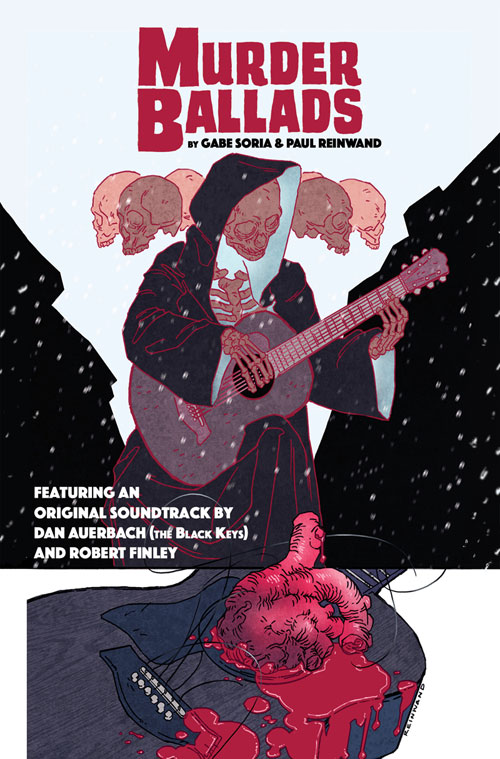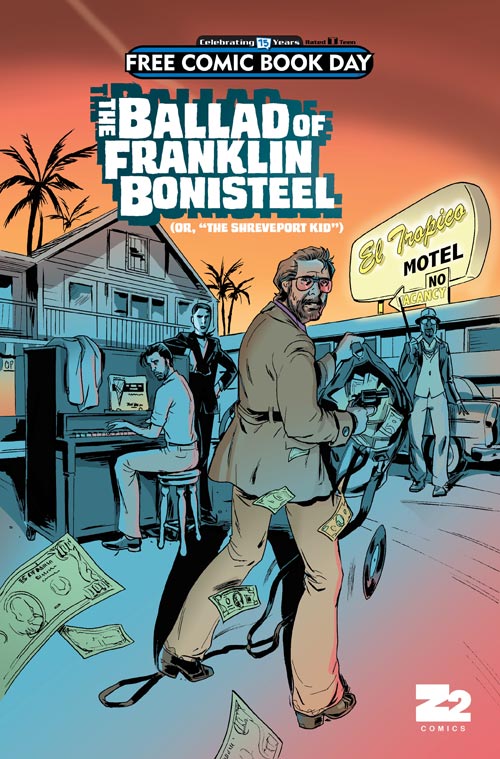Songs of Doom For Some Memorable Murders
Apr 28, 2017
 |
by Vince Brusio
Gabe Soria has written a book that is not only found in the PREVIEWS catalog, but which will be mirrored on Free Comic Book Day with Z2’s The Ballad of Franklin Bonisteel. The book we’re referring to is titled Murder Ballads (APR172207), and it has already received an amazing reception at the retailer summit in Chicago, as well as attention in New York Magazine, Rolling Stone, Pitchfork, Stereogum, and more. In this PREVIEWSworld Exclusive interview, Gabe Soria sings a new song of joy. The funeral march has been halted. For now.
**********
Vince Brusio: Your book, Murder Ballads TP (APR172207), seems to have been spawned from the wreckage of an old Nick Cave & The Bad Seeds album. Tell us, how does this book take a detour from stopping at O’Malley’s Bar, and instead explore the themes of music, race, and obsession?
Gabe Soria: That Bad Seeds record was definitely on my mind while writing Murder Ballads (and I wholeheartedly recommend it to anyone out there reading this who hasn’t heard it – it’s a work of monstrous beauty, especially the song “Crow Jane” and the epic “Stagger Lee”), but when I think of murder ballads, at least when it comes to this book, I think of American myth, told in song. I think about certain folks’ ideas about what is real and what is “authentic,” and what we think we know or think we can expect from the people who sing songs to us. In the case of Murder Ballads, we have Nate Theodore, a young, music-obsessed white man who happens upon two musicians, Donny and Marvell Fontweathers, two black men, who embody everything he genuinely loves about music, the visceral punch of it and the mythic qualities he ascribes to it. They’re basically a dream come true for Nate, a mythic ideal, and Murder Ballads is about how that sort of romanticizing can sometimes go off the rails.
Vince Brusio: In this story, Nate Theodore is trying to reinvent himself. And yet, we’re learning that he’s driving his marriage off the cliff at the same time. So who’s the unlucky girl? Who’s the better half that’s close to getting thrown under the bus, and left for dead? What’s the point of this car crash?
Gabe Soria: Nate’s basically a stand-in for anybody in a relationship who, no matter how much they love their partner, can’t wake the hell up and see that they’re squandering something right in front of them for a far-off ambition. He knows that his wife, Mary, loves him. He knows that she shares his passion for music equally. But for some reason, he thinks he has something to prove to her. Mary, for her part, is anybody in a relationship who knows that something has to change and that they should probably have taken the past few opportunities to make an exit, but who is stopped by love and stubbornness. You could probably write a song about a relationship like that. Hell, I could name a few right here.
Vince Brusio: Salvation is linked to the blues. Two African-American brothers who play a singular version of doom-laden country blues appear to be the pot of gold at the end of the rainbow. What’s the significance of this plot device?
Gabe Soria: Once again this falls into the realm of American pop culture myth, at least to me. It’s a sort of music business Horatio Alger story: the dream of discovery and being discovered, of going somewhere you’re perhaps not supposed to be and being in the right place at the right time and seeing or hearing something magical and taking on the almost holy task of bringing word of that to the people. It can altruistic, because damn, I know that feeling – that song is GOOD, that musician is AMAZING, I have to share this with the world. Personally, I’ve done it many times, and it feels great when you’re proven right. When you see a band or musician you’ve championed get the respect and honor they’re due? It’s a high unlike any other. But there’s a flipside to this. There’s a well-documented history of racial musical exploitation, of terrible deals and shady business. That tension has been there since the birth of the American music industry, and Murder Ballads explores that tension through a noir-ish lens.
Vince Brusio: This book is not only a trade paperback, but it’s also being offered as a single issue on Free Comic Book Day, correct? How are the two editions compatible? Or are they completely different?
Gabe Soria: Well, the graphic novel “Murder Ballads” and the Free Comic Book Day comic “The Ballad of Franklin Bonisteel” are two entirely separate stories, but they’re related in that they take place in the same alternate musical pocket universe in my head and feature a common character. They take place a few decades apart, and you don’t need to read one to understand the other, but there are dots to connect. It’s strange, but I seem to be creating a fictional universe of fictional musicians, songs and albums.
Vince Brusio: We hear there’s a soundtrack that accompanies this story, yes? How was that produced, and how does the music relate to the story?
Gabe Soria: The soundtrack for Murder Ballads was written by my friend Dan Auerbach of the Black Keys, who wrote and recorded it in his studio in Nashville. It was actually a fun sort of collaboration, because every song is meant to be a song performed or heard in the book. I wrote an outline of what each song should feel like and what sort of thematic touchstones they should contain, a few with titles and few without, and Dan would call me up, ask questions and then, like a wizard, have something amazing ready. That dude works. And the resulting songs? Incredible. I got to watch him and his crew record them last October and…phew. Just phenomenal. Mind-blowing. Dan’s a good dude. One of the best, in fact.
 |
**********
Vince Brusio writes about comics, and writes comics. He is the long-serving Editor of PREVIEWSworld.com, the creator of PUSSYCATS, and encourages everyone to keep the faith...and keep reading comics.




